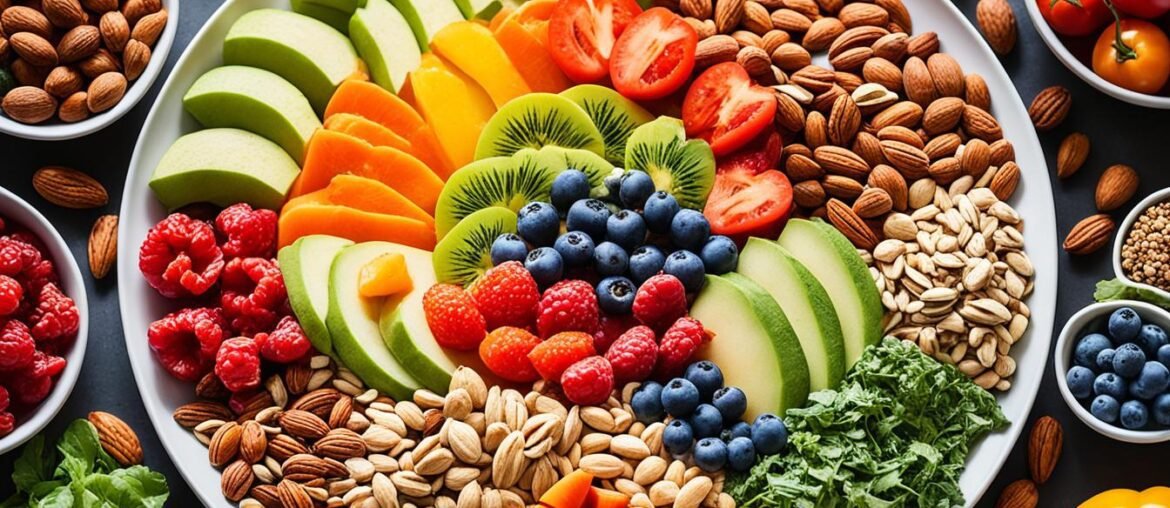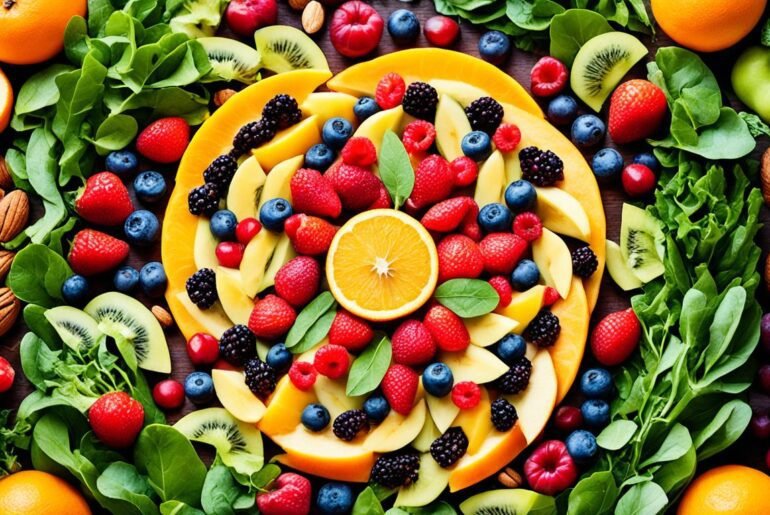Did you know that the foods you eat can have a direct impact on the health and appearance of your skin? Your diet plays a crucial role in skin rejuvenation, providing the essential nutrients needed for a youthful and glowing complexion.
As the largest organ of your body, your skin requires nourishment from within to maintain its youthfulness and promote rejuvenation. In this article, I will explore the best diet tips and strategies for achieving healthy and radiant skin naturally.
Key Takeaways:
- A balanced diet is essential for promoting skin rejuvenation and maintaining a healthy complexion.
- Antioxidant-rich foods are powerful allies in protecting the skin from oxidative damage and promoting skin health.
- Essential nutrients, such as vitamins and minerals, play a key role in skin rejuvenation and overall skin health.
- Including healthy fats in your diet can improve skin hydration, elasticity, and structure.
- Phytoestrogens found in certain plant-based foods can support hormonal balance and contribute to healthy skin.
The Impact of Diet on Skin Health
Our dietary choices have a significant impact on our skin health. While genetics, age, and lifestyle factors play a role in the health and aging of the skin, diet also plays a crucial role. Nutrient deficiencies and an unhealthy diet can contribute to skin problems such as wrinkles, sagging skin, and a dull complexion. On the other hand, a well-balanced diet rich in essential nutrients can support collagen production, improve skin elasticity, and promote a youthful and radiant complexion.
As we age, our skin naturally undergoes changes that affect its appearance and function. Collagen, a protein that provides structure and elasticity to the skin, starts to break down. The production of new collagen slows down, resulting in the loss of skin elasticity and the formation of wrinkles. Additionally, decreased oil production and reduced blood flow to the skin can lead to dryness and a dull complexion.
However, by making conscious choices about our diet, we can positively influence the health and aging process of our skin. Certain nutrients play a vital role in maintaining skin health and promoting a youthful appearance.
The Role of Diet in Collagen Production
Collagen is essential for maintaining the structure and elasticity of the skin. It provides support and helps keep the skin firm and plump. Diet can significantly impact collagen production in the body.
Consuming foods rich in amino acids, such as lean proteins like chicken, fish, and legumes, provides the building blocks for collagen synthesis. Vitamin C is vital in this process as it aids in the formation and structure of collagen. Citrus fruits, strawberries, bell peppers, and leafy green vegetables are excellent sources of vitamin C.
“A diet rich in amino acids and vitamin C can support collagen production and help improve skin elasticity.”
The Link Between Diet and Skin Elasticity
Skin elasticity refers to the ability of the skin to stretch and bounce back to its original shape. Good skin elasticity is crucial for maintaining a youthful appearance. Diet plays a role in preserving and improving skin elasticity.
Omega-3 fatty acids, found in fatty fish like salmon and sardines, as well as walnuts and chia seeds, have been shown to support skin health and elasticity. These healthy fats have anti-inflammatory properties that help reduce skin inflammation and maintain its suppleness.
“Incorporating omega-3 fatty acids into the diet can help improve skin elasticity and preserve its youthful appearance.”
The Importance of Antioxidants in Skin Health
Antioxidants are crucial for protecting the skin from free radical damage. Free radicals are unstable molecules that can damage collagen and elastin, leading to premature aging and skin problems.
A diet rich in antioxidants can help counteract the harmful effects of free radicals. Brightly colored fruits and vegetables, such as berries, spinach, and carrots, are excellent sources of antioxidants.
“Consuming a diet high in antioxidants can help protect the skin from free radical damage and promote overall skin health.”
A Well-Balanced Diet for Healthy Skin
To support skin health and promote a youthful complexion, it is essential to maintain a well-balanced diet that includes a variety of nutrient-dense foods.
Including plenty of fruits, vegetables, whole grains, lean proteins, and healthy fats in your diet provides the necessary vitamins, minerals, and antioxidants for optimal skin health. It is also important to stay hydrated by drinking enough water throughout the day.
| Essential Nutrients for Skin Health | Food Sources |
|---|---|
| Vitamin C | Citrus fruits, strawberries, bell peppers |
| Omega-3 Fatty Acids | Fatty fish like salmon and sardines, walnuts, chia seeds |
| Antioxidants | Berries, spinach, carrots |
By incorporating these nutrient-rich foods into your diet, you can support collagen production, improve skin elasticity, and enhance overall skin health.
“Maintaining a well-balanced diet can provide the necessary nutrients for healthy and youthful-looking skin.”
The Power of Antioxidants for Skin Rejuvenation
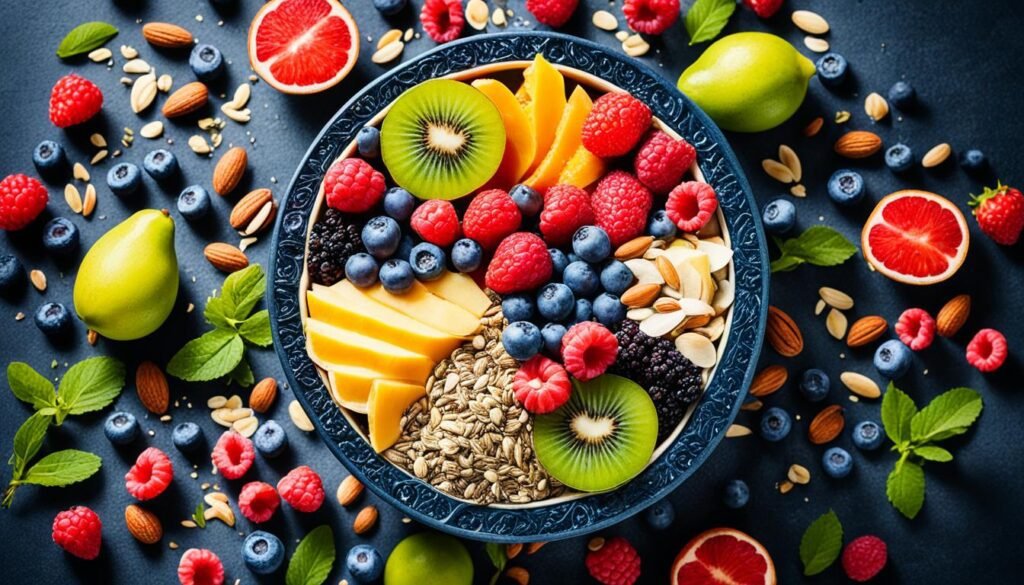
Antioxidants play a vital role in maintaining skin health and promoting rejuvenation. These powerful compounds help protect the skin from oxidative damage caused by free radicals, which are generated by various external factors like pollution, UV radiation, and stress. Free radicals contribute to skin aging and can lead to the appearance of wrinkles, fine lines, and other signs of skin damage.
To combat the harmful effects of free radicals and promote skin rejuvenation, consuming a diet rich in antioxidant-rich foods is essential. These foods contain essential vitamins like vitamin C and E, as well as other beneficial compounds like carotenoids that support skin health.
Fruits and vegetables are excellent sources of antioxidants. Colorful berries, such as blueberries, strawberries, and raspberries, are packed with antioxidants that help fight free radical damage. Citrus fruits like oranges and lemons are rich in vitamin C, a potent antioxidant that boosts collagen production and promotes healthy skin. Leafy greens like spinach and kale are also high in antioxidants and provide a wide range of essential nutrients for skin health.
In addition to fruits and vegetables, other antioxidant-rich foods include herbs like turmeric and ginger, which possess anti-inflammatory properties that benefit the skin. Green tea, a popular beverage known for its antioxidant content, can also support skin health and rejuvenation.
“Consuming a diet rich in antioxidant-rich foods can help combat the harmful effects of free radicals and promote skin rejuvenation.”
– [Stacy Collins, Dermatologist]
Incorporating these antioxidant-rich foods into your daily diet can provide the necessary nutrients to protect and rejuvenate your skin. By choosing a wide variety of antioxidant-rich fruits, vegetables, and herbs, you can support your skin’s health and enhance its natural radiance and youthfulness.
Essential Nutrients for Skin Rejuvenation
When it comes to achieving healthy and youthful skin, the importance of essential nutrients cannot be overlooked. These nutrients play a crucial role in skin rejuvenation, supporting collagen synthesis, protecting against oxidative damage, and promoting overall skin health.
Let’s explore some of the key essential nutrients and their benefits for achieving radiant and rejuvenated skin:
Vitamins for Skin Rejuvenation
Vitamin C: This vitamin is essential for collagen production, a protein that gives skin its elasticity and firmness. Additionally, vitamin C aids in wound healing and protects the skin from free radical damage.
Vitamin E: As a powerful antioxidant, vitamin E helps protect the skin from oxidative stress and damage caused by environmental factors. It also promotes skin hydration and supports overall skin health.
Vitamin A: This vitamin is crucial for maintaining healthy skin cells and promoting skin cell turnover. It helps reduce signs of aging, improves skin texture, and supports a smooth and youthful complexion.
Vitamin K: Vitamin K plays a role in reducing dark circles and under-eye puffiness, promoting a brighter and more revitalized appearance.
B Vitamins: B vitamins, such as biotin and niacinamide, contribute to skin health by supporting hydration, reducing inflammation, and enhancing the skin’s natural barrier function.
Minerals for Skin Rejuvenation
Zinc: This mineral is crucial for proper wound healing, collagen synthesis, and maintaining skin integrity. It also has anti-inflammatory properties, making it beneficial for acne-prone skin.
Selenium: Selenium helps protect the skin from UV damage and oxidative stress. It also supports the production of glutathione, a powerful antioxidant that contributes to skin health.
Magnesium: Magnesium plays a role in skin hydration and barrier function. It helps regulate sebum production and reduce the occurrence of acne and other skin conditions.
By including a wide variety of foods rich in these essential nutrients in your diet, you can provide your skin with the building blocks it needs for rejuvenation and radiance. Fruits, vegetables, whole grains, lean proteins, and nuts are excellent sources of these essential nutrients.
Essential Nutrients for Skin Rejuvenation
| Essential Nutrient | Benefits for Skin | Food Sources |
|---|---|---|
| Vitamin C | Promotes collagen production and wound healing | Citrus fruits, berries, kiwi, leafy greens |
| Vitamin E | Protects against oxidative damage and supports skin hydration | Almonds, sunflower seeds, spinach, avocado |
| Vitamin A | Improves skin texture and reduces signs of aging | Carrots, sweet potatoes, liver, leafy greens |
| Vitamin K | Reduces dark circles and under-eye puffiness | Kale, spinach, broccoli, Brussels sprouts |
| B Vitamins | Support skin hydration, reduce inflammation, and enhance the skin’s natural barrier function | Whole grains, eggs, dairy, legumes |
| Zinc | Promotes wound healing, collagen synthesis, and reduces inflammation | Pumpkin seeds, oysters, lean meats, legumes |
| Selenium | Protects against UV damage and oxidative stress | Brazil nuts, seafood, whole grains |
| Magnesium | Supports skin hydration, regulates sebum production | Spinach, almonds, black beans, whole grains |
Remember, achieving healthy and rejuvenated skin involves nourishing your body from within. By incorporating a variety of foods rich in essential nutrients, you can support your skin’s health, promote collagen synthesis, and achieve a radiant complexion.
Healthy Fats for Skin Rejuvenation
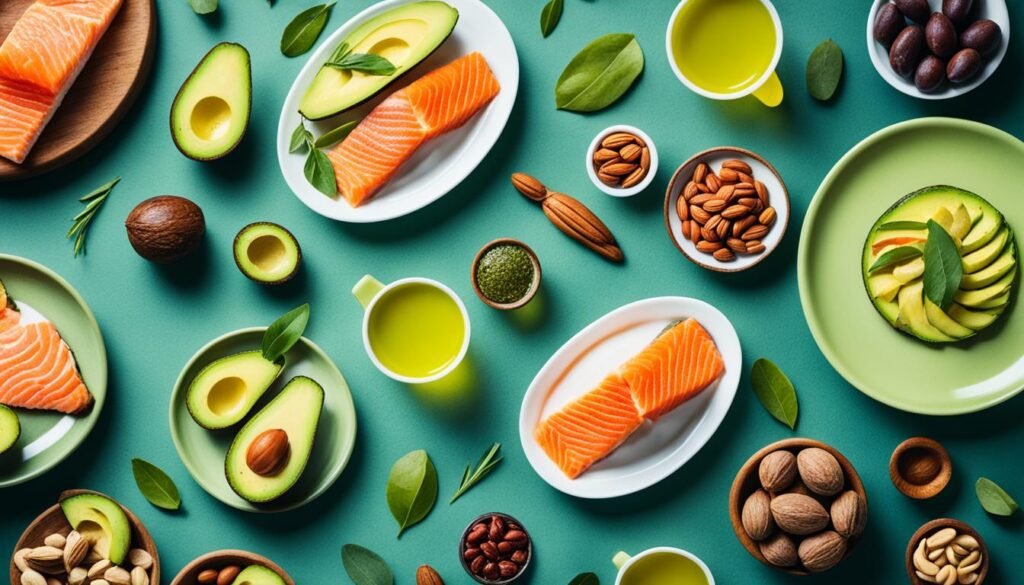
When it comes to skin health and rejuvenation, incorporating healthy fats into your diet is essential. Healthy fats are crucial for maintaining skin hydration, elasticity, and overall structure. They provide nourishment and support to your skin, helping it look and feel its best. Two types of healthy fats that are particularly beneficial for skin health are omega-3 fatty acids and monounsaturated fats.
The Power of Omega-3 Fatty Acids
Omega-3 fatty acids have been widely recognized for their numerous health benefits, and they also play a significant role in skin rejuvenation. These essential fats have anti-inflammatory properties, which can help alleviate skin conditions like eczema and psoriasis. Omega-3 fatty acids are found in oily fish such as salmon, mackerel, and sardines. They are also present in vegetarian sources like flaxseeds and walnuts. Including these foods in your diet can provide you with a good dose of omega-3 fatty acids to promote skin rejuvenation and improve skin health.
Nourishing Your Skin with Monounsaturated Fats
Monounsaturated fats are another type of healthy fat that can contribute to skin rejuvenation. These fats are abundant in foods like avocados and olive oil. They provide nourishment and moisturization to the skin, helping to maintain its elasticity and suppleness. Incorporating these foods into your diet can support overall skin health and enhance the appearance of your skin.
Here’s a table summarizing some excellent food sources of healthy fats for skin rejuvenation:
| Foods | Healthy Fats |
|---|---|
| Oily fish (salmon, mackerel, sardines) | Omega-3 fatty acids |
| Flaxseeds | Omega-3 fatty acids |
| Walnuts | Omega-3 fatty acids |
| Avocados | Monounsaturated fats |
| Olive oil | Monounsaturated fats |
By incorporating these healthy fats into your diet, you can provide your skin with the necessary nutrients for rejuvenation and enhance its overall health and appearance.
The Role of Phytoestrogens in Skin Health
Phytoestrogens are natural compounds found in plants that can interact with estrogen receptors in the body. These compounds have gained attention for their potential role in maintaining hormonal balance, which is important for healthy skin structure and minimizing skin damage.
By including foods rich in phytoestrogens in your diet, you can support your overall skin health and promote skin rejuvenation. Some examples of foods that are rich in phytoestrogens include:
- Soy products
- Flaxseeds
- Whole grains
- Fruits
- Vegetables
These foods provide a natural source of phytoestrogens and can help maintain hormonal balance, which in turn supports healthy skin. Incorporating these phytoestrogen-rich foods into your daily meals can contribute to the rejuvenation of your skin.
It’s important to note that while phytoestrogens have potential benefits for skin health, more research is needed to fully understand their effects. Additionally, individual needs and responses to phytoestrogens may vary, so it’s recommended to consult with a healthcare professional before making any significant changes to your diet.
Expert Quote:
“Phytoestrogens found in certain plant-based foods can provide supportive compounds that help maintain hormonal balance, which is crucial for healthy skin structure and function.” – Dr. Angela Smith, Dermatologist
Nutrient Comparison of Foods Rich in Phytoestrogens
| Foods | Phytoestrogen Content | Other Beneficial Nutrients |
|---|---|---|
| Soy products (e.g., tofu, tempeh) | High | Protein, fiber, vitamins, minerals |
| Flaxseeds | Moderate | Omega-3 fatty acids, fiber, lignans |
| Whole grains (e.g., oats, barley) | Low | Complex carbohydrates, fiber, vitamins, minerals |
| Fruits (e.g., apples, berries) | Low | Vitamins, minerals, antioxidants |
| Vegetables (e.g., broccoli, kale) | Low | Vitamins, minerals, antioxidants |
While each of these foods contains varying amounts of phytoestrogens, they also offer other beneficial nutrients that contribute to overall skin health. Incorporating a variety of these foods into your diet can provide a range of phytoestrogens along with essential vitamins, minerals, and antioxidants.
Hydration for Skin Rejuvenation
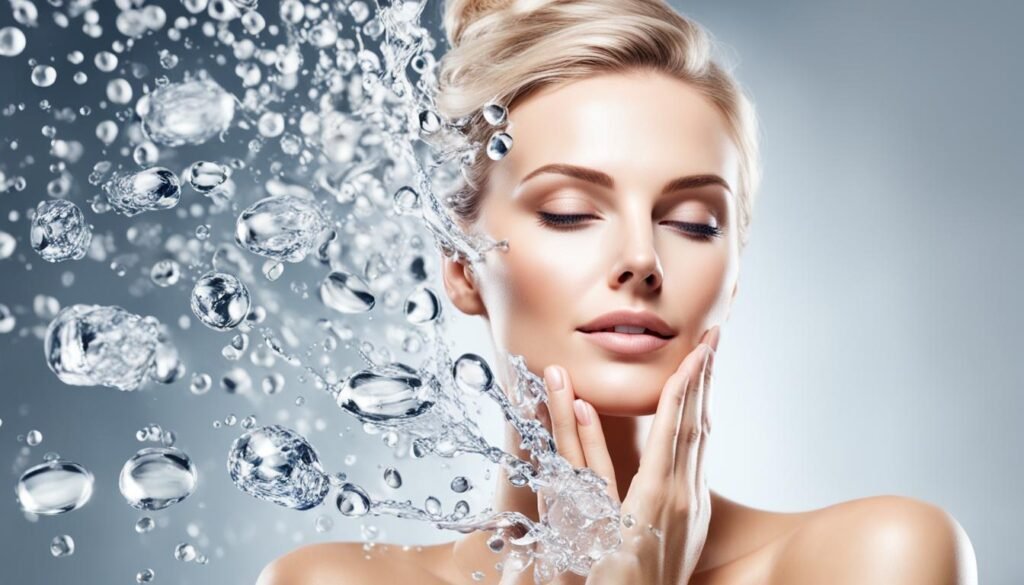
Adequate hydration is crucial when it comes to maintaining the moisture and flexibility of your skin. Without proper hydration, your skin can become dry, dull, and prone to premature aging. That’s why staying hydrated is not only important for your overall health but also for preserving the youthfulness and vitality of your skin.
The benefits of water for skin rejuvenation cannot be overstated. Drinking enough water throughout the day helps to hydrate your skin from within, keeping it plump and supple. In addition to water, consuming hydrating foods can also contribute to your skin’s hydration levels. Foods like watermelon, cucumber, and zucchini are packed with water content, making them excellent choices for promoting skin hydration.
Curious about the visual representation of the benefits of hydration for skin health? Take a look at the table below:
| Benefits of Hydration for Skin Rejuvenation | |
|---|---|
| Improved skin moisture | Hydrated skin appears plump and radiant. |
| Reduced dryness and flakiness | Adequate hydration prevents skin from becoming dry and flaky. |
| Enhanced elasticity | Proper hydration helps maintain skin’s elasticity, reducing the appearance of fine lines and wrinkles. |
| Healthy complexion | Hydrated skin has a vibrant, healthy glow. |
As you can see from the table, staying properly hydrated has numerous benefits for your skin. It not only improves skin moisture and reduces dryness but also enhances skin elasticity and contributes to a healthy complexion.
Remember, maintaining hydration for skin rejuvenation is not just about drinking water. It’s also about incorporating hydrating foods into your diet and making it a habit to consume them regularly. So, make sure to prioritize hydration as part of your overall skincare routine and enjoy the benefits of healthy, rejuvenated skin.
Dietary Tips to Support Skin Rejuvenation
When it comes to achieving radiant and youthful skin, incorporating specific nutrients into your diet is essential. However, there are also additional dietary tips that can further support skin rejuvenation and enhance your complexion and skin elasticity. By following these guidelines, you can maintain a youthful appearance and promote overall skin health.
- Consume a minimum of five portions of fruits and vegetables daily: Fruits and vegetables are rich in vitamins, minerals, and antioxidants that are vital for skin health. They help nourish the skin from within and protect it from oxidative damage caused by free radicals. Aim for a variety of colorful produce to ensure a wide range of beneficial nutrients.
- Choose foods high in vitamins C and E: Vitamin C is a potent antioxidant that supports collagen production and helps maintain the skin’s firmness and elasticity. Vitamin E, on the other hand, protects the skin from environmental damage and helps retain moisture. Incorporate foods such as citrus fruits, berries, leafy greens, nuts, and seeds into your diet to boost your intake of these essential vitamins.
- Incorporate zinc-rich foods: Zinc is an essential mineral that plays a crucial role in skin health. It helps regulate oil production, promotes wound healing, and supports skin cell renewal. Foods like oysters, lean meats, legumes, seeds, and whole grains are excellent sources of zinc.
- Include low-GI carbs: Opt for low glycemic index (GI) carbohydrates that are digested slowly and have a minimal impact on blood sugar levels. High-GI foods can cause inflammation and lead to skin problems like acne. Instead, choose whole grains, legumes, and non-starchy vegetables as your primary source of carbohydrates.
- Avoid crash diets: Crash diets that severely restrict caloric intake can deprive your body of essential nutrients, including those necessary for skin health. These diets can lead to dull complexion, dryness, and skin sagging. Instead, focus on adopting a balanced and sustainable eating plan that provides all the necessary nutrients for your skin’s rejuvenation.
- Reduce the consumption of processed foods and added sugars: Processed foods and added sugars can trigger inflammation and accelerate the skin’s aging process. Opt for whole, unprocessed foods as much as possible and limit your intake of sugary drinks, snacks, and desserts.
By incorporating these dietary tips into your daily routine, you can enhance your skin complexion, promote skin elasticity, and maintain a youthful appearance. Remember, nourishing your skin from within through a well-balanced diet is a powerful strategy for achieving radiant and healthy skin.
The Impact of Diet on Common Skin Problems
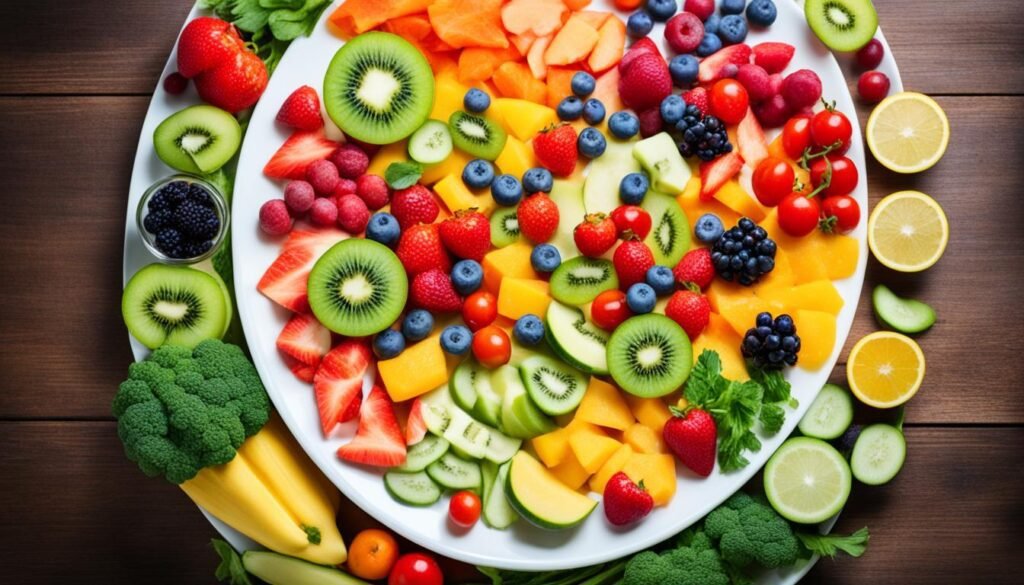
The link between diet and various skin conditions has been extensively studied. While diet alone may not be the sole cause of these conditions, it can influence their severity and progression. Certain foods, such as those with a high glycemic index or allergenic potential, can exacerbate acne and eczema. On the other hand, consuming a diet rich in anti-inflammatory foods and nutrients may help alleviate symptoms of psoriasis. Understanding the connection between diet and these common skin problems can empower individuals to make informed dietary choices for optimal skin health.
The Impact of Diet on Acne
Acne is a common skin condition that affects many individuals. Research suggests that diet can play a role in the development and exacerbation of acne. Although the relationship between specific foods and acne is complex and varies among individuals, certain dietary factors have been implicated in worsening acne symptoms.
| Factors that may worsen acne | Examples of Foods |
|---|---|
| High glycemic index foods | White bread, sugary drinks, processed snacks |
| Dairy products | Milk, cheese, yogurt |
| Food high in unhealthy fats | Fried foods, fast food, processed meats |
| Excessive consumption of chocolate | Chocolate bars, candies |
While eliminating these foods entirely may not be necessary or practical, reducing their intake and focusing on a balanced diet that includes fresh fruits, vegetables, lean proteins, and whole grains can promote healthier skin and potentially alleviate acne symptoms.
The Impact of Diet on Psoriasis
Psoriasis is an autoimmune skin condition that causes red, scaly patches on the skin. While diet cannot cure psoriasis, certain dietary choices may help manage symptoms and promote overall skin health.
Avoiding triggers like alcohol and tobacco, as well as reducing stress levels, can have a positive impact on psoriasis. Additionally, incorporating anti-inflammatory foods rich in omega-3 fatty acids, such as fatty fish (salmon, mackerel), flaxseeds, and walnuts, may help reduce inflammation and ease psoriasis symptoms.
The Impact of Diet on Eczema
Eczema, also known as atopic dermatitis, is a chronic skin condition characterized by itching, dryness, and inflammation. While the exact cause of eczema is unknown, certain dietary factors may contribute to its development and aggravation.
Foods that commonly trigger eczema flare-ups include dairy products, eggs, nuts, soy-based products, and gluten-containing grains. It is important for individuals with eczema to identify their specific trigger foods through an elimination diet or with the guidance of a healthcare professional.
Adopting a balanced diet that focuses on whole, unprocessed foods and incorporates a variety of fruits, vegetables, lean proteins, and healthy fats can support overall skin health and potentially reduce the severity of common skin problems like acne, psoriasis, and eczema.
Conclusion
Maintaining healthy and rejuvenated skin requires more than just skincare products and treatments. It involves adopting a well-balanced diet that includes antioxidant-rich foods, essential nutrients, healthy fats, and hydration. By nourishing the skin from within, individuals can achieve a youthful glow and improve the overall health and appearance of their skin.
Antioxidants play a crucial role in promoting skin rejuvenation by protecting the skin from oxidative damage caused by free radicals. Including foods such as fruits, vegetables, herbs, and green tea in the diet provides essential vitamins and beneficial compounds that support skin health.
In addition to antioxidants, essential nutrients like vitamins C, E, A, K, and B vitamins, as well as minerals like zinc, selenium, and magnesium, are vital for skin rejuvenation. Including a variety of foods rich in these nutrients supports collagen synthesis, wound healing, and overall skin health.
Furthermore, incorporating healthy fats, such as omega-3 fatty acids from sources like oily fish, flaxseeds, and walnuts, and monounsaturated fats from avocados and olive oil, can enhance skin hydration, elasticity, and structure. Phytoestrogens found in soy products, flaxseeds, whole grains, fruits, and vegetables can also contribute to healthy skin structure.
Hydration is essential for maintaining skin moisture and flexibility. Drinking enough water and consuming hydrating foods like watermelon, cucumber, and zucchini can help keep the skin hydrated from the inside out. Following these dietary strategies and tips can support long-term skin health and contribute to a vibrant and radiant complexion.
FAQ
Can diet really affect the health and appearance of your skin?
Yes, diet plays a crucial role in maintaining skin health and promoting skin rejuvenation. Nutrient deficiencies and an unhealthy diet can contribute to skin problems, while a well-balanced diet can support collagen production, improve skin elasticity, and promote a youthful complexion.
How can antioxidants help with skin rejuvenation?
Antioxidants protect the skin from oxidative damage caused by free radicals, which contribute to skin aging. Consuming antioxidant-rich foods such as fruits, vegetables, herbs, and green tea can help combat the harmful effects of free radicals and promote skin rejuvenation.
What are the essential nutrients for skin rejuvenation?
Essential nutrients like vitamins C, E, A, K, and B vitamins, as well as minerals like zinc, selenium, and magnesium, play a key role in supporting skin health and rejuvenation. Including a variety of foods rich in these nutrients, such as fruits, vegetables, whole grains, lean proteins, and nuts, is important for healthy and youthful skin.
How do healthy fats contribute to skin rejuvenation?
Healthy fats, such as omega-3 fatty acids found in oily fish, flaxseeds, and walnuts, and monounsaturated fats found in avocados and olive oil, are essential for maintaining skin hydration, elasticity, and structure. Including these fats in the diet can promote skin rejuvenation and enhance overall skin health and appearance.
What is the role of phytoestrogens in skin health?
Phytoestrogens are natural compounds found in plants that can interact with estrogen receptors in the body. They help maintain hormonal balance, which is important for healthy skin structure and minimizing skin damage. Foods rich in phytoestrogens include soy products, flaxseeds, whole grains, fruits, and vegetables.
How does hydration affect skin rejuvenation?
Adequate hydration is essential for maintaining skin moisture and flexibility. Drinking enough water and consuming hydrating foods like watermelon, cucumber, and zucchini can help keep the skin hydrated from the inside out, promoting skin rejuvenation and overall health.
What are some dietary tips for supporting skin rejuvenation?
Some dietary tips include consuming a minimum of five portions of fruits and vegetables daily, choosing foods high in vitamins C and E, incorporating zinc-rich foods, including low-GI carbs, avoiding crash diets, and reducing the consumption of processed foods and added sugars.
How does diet affect common skin problems like acne, psoriasis, and eczema?
While diet alone may not be the sole cause of these conditions, it can influence their severity and progression. Certain foods, such as those with a high glycemic index or allergenic potential, can exacerbate acne and eczema. Consuming a diet rich in anti-inflammatory foods and nutrients may help alleviate symptoms of psoriasis.

